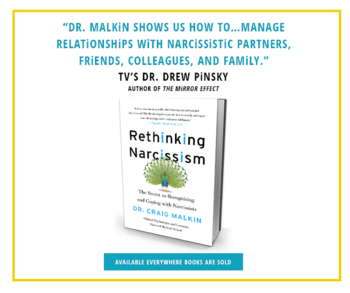The more time we spend with people, the more they literally become a part of us. We think of ourselves, often, not just as individuals, but one point in a vast network of human connections: I'm not simply Craig or Dr. Malkin, but Anna's therapist, Jennifer's husband, Eugene's son. Our identity is tied to the people we love. When these strands of connection become stretched or frayed by anger and pain, we fight to hold on, partly because we're fighting to preserve a part of ourselves. What began as a bond soon becomes a tether.
When Anna decides she can't see Neil anymore, she ceases to be "Neil's girlfriend." It's one loss in a series of many. They'll stop living together. They'll stop eating together. They'll have to sort through the evidence of their identity as a couple--the furniture and assorted knick-knacks--and decide who gets what. The process of extracting shared possessions from "Neil and Anna, the couple" and redistributing them to two, separate people can be as painful as a root canal. Which is why instead of leaving, we often find reasons to stay. One of the more insidious ways we do that is through self-blame.
Self-blame comes in handy when a relationship no longer works and leaving feels too painful. If we convince ourselves that someone's being hurtful or insensitive because of our own failings, there's still hope. All we have to do is improve. If I'm the problem, then the happiness of the relationship is entirely in my hands. It's a solution that preserves hope at the expense of our self-esteem.
This is the trade Anna had made in her own childhood. Her father, who drank heavily, often exploded with rage. Rather than accept her powerlessness in the face of this, she decided somewhere along the line that if she just became more obedient or thoughtful, he'd become nicer. With Neil, she'd continued to find hope the same way--and now, it kept her trapped. Regardless of how hard she worked to leave, her self-blame pulled her back.
One way you can liberate yourself from this kind of self-criticism is by confronting a feeling you've probably come to fear more than you realize: disappointment.
Chronic self-blamers bury their disappointment because, in the past, voicing it might have made things worse. For many people, the fallout from daring to tell their family That hurt my feelings or I really wanted you at my recital would have been too great. In Anna's family, even when she didn't feel hurt, angry yelling and deafening silence had been the norm. Her father made her feel like a burden when she so much as hinted at feeling unhappy, shouting or sulking until she fell silent. Either way, it became easier for her to swallow her disappointment by taking his message to heart: You're the problem. You expect too much.
Remind yourself: You have a right to your disappointment. If you share your needs and feelings and it actually drives the person away, then you can't be happy in the relationship. The solution isn't to slide down the spectrum and become Echo. Recognize self-blame for what it is: a powerful fear that you'll lose love if you ask for what you want. It keeps you stuck in the wrong relationship, with someone who needs you to bury your needs. The only way to find out if they can give you more care or attention or empathy is it to invite them to. And you can't do that if you blame yourself for what's missing.
Disappointment, far from being a threat to intimacy, often deepens it. Being clear about when your relationship leaves you feeling neglected, alone, unworthy, or small puts you back in touch with your own needs. It brings you closer to your lovers and friends. It teaches them how to love you. And there are some simple steps to getting back in touch with healthy disappointment:
- Create healthy boundaries. If something hurts, say so. It's not your job to protect your partner or friend from knowing they've behaved badly. By all means, share the disappointment in a vulnerable way. It's your best chance of being heard. But don't let people think you're happy when you're not. That's Echo's trick. If they can't tolerate hearing that you're hurt, they're likely to go on hurting you.
- Check your self-blame at the door. When something upsetting happens between you and your partner or friend, keep in mind your fear of losing them is bound to throw you back into self-blame. Instead of asking What have I done wrong?, ask Am I feeling disappointed? Am I afraid to say something's wrong?
- Don't confuse empathy with responsibility. It's fine to try understanding why someone's feeling upset, even when they've hurt you. Maybe your last few comments came across as cold or critical. But you can always correct that by offering a sincere apology. It's your partner's choice to handle their upset by lashing out. Don't make yourself responsible for anyone's actions but your own. That's just another way of blaming yourself instead of feeling disappointed.
- Treat your PTSD. For many abuse survivors, the cruel irony is that their trauma symptoms can keep them stuck. Nothing stirs self-doubt more than constant messages you're the one with the problem--or worse "crazy," as emotional abusers who love to gaslight often claim. If you're recovering from trauma, you'll need help feeling sane again. It's this very problem that I address in the following video.
This post is partially excerpted with the permission of HarperCollins from Rethinking Narcissism.
Where do you fall in the narcissism spectrum? Too high or too low? Take the narcissism test and find out.
Sign up for my newsletter, for more tips and advice, as well as information on my book, Rethinking Narcissism.
This post originally appeared at psychology today.
Need help? In the U.S., call 1-800-799-SAFE (7233) for the National Domestic Violence Hotline.

